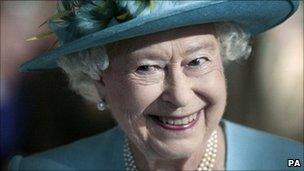Queen's expenditure falls by £1.8m in a year
- Published
- comments

The way the Queen receives funding from the government is set to change
The cost to taxpayers of funding the Queen's spending has dropped by £1.8m, Buckingham Palace says.
The Queen's official expenditure for 2010-11 dropped to £32.1m from £33.9m in the previous fiscal year.
The figures have not been calculated in the same way as in previous years because of planned changes to funding.
In the past, the monarch received money from three different government departments, but now funds will be tied to the revenue of the Crown Estate.
The Buckingham Palace figures , external include the cost of the Civil List paid to the monarch; the amount spent on maintenance of the royal palaces and the cost of most royal travel.
But the amount it costs the Queen to carry out official government duties such as the administration of the honours system, state visits to and by the Queen as well as the employment of orderlies and equerries, is excluded from the total as these costs are met directly by government departments and the Crown Estate.
The Crown Estate has a property portfolio, external which includes numerous buildings, business parks and land ownership.
It is worth £6.2bn and has an annual revenue of more than £200m.
The latest report shows the cost of the Queen's travel was £6m for the last financial year. In 2009-10, travel cost £5.4m.

Property services fell from £15.4m to £11.9m while the Civil List, which pays for central staff costs and running expenses of the official household, fell from £14.2m to £13.7m.
The Sovereign Grant Bill, external, approved by MPs last week, will introduce a single grant given to the monarch based on 15% of the Crown Estate's revenue from two years previously.
Starting from 2013-14, this funding arrangement will last seven years before it is reviewed.
Currently the monarchy receives funding from three different areas: funds for the Civil List come from the Treasury; travel is paid via a grant from the Department for Transport; and the maintenance of royal palaces and communications, comes from the Department for Culture, Media and Sport's budget.
The budget for 2012 has already been set at £30m with an extra £1m for costs incurred for the diamond jubilee celebrations.
Sir Alan Reid, keeper of the privy purse, said: "The Queen is very keen that the royal household should continue to reduce its expenditure in line with public expenditure reductions.
"The decrease in expenditure is due mainly to increased income generation, the deferral of property maintenance expenditure and the implementation of a pay freeze.
"This pay freeze will continue on to this year."
He added that it would be "very difficult" for expenditure to reduce "very much further" without having an effect on the royal household's work to support the Queen and the long-term health of the estate.
Further cuts in funding will mean the budget for projects in the annual works programme is likely to be reduced from £4m in 2010-11 to around £3m in 2012-13, the report states.
The reduction means projects such as the extensive renewal of lead and slate roofs at Buckingham Palace and Windsor Castle will be scaled-back and the refurbishment of the state rooms at Buckingham Palace and Windsor Castle will not be undertaken.
Other projects affected include replacement of existing heating and electrical services at Buckingham Palace, with associated asbestos removal, which will now take 15 to 20 years to complete.
Anti-monarchy group Republic said Buckingham Palace should reveal the "true cost" of having a royal family.
Spokesperson Graham Smith said the monarchy cost over £200m each year and that proper scrutiny and honesty was "well overdue".
"The monarchy is hugely expensive, it wastes taxpayers' money every week, it is not properly accountable and it continues to demand more. This is not an issue that can be swept to one side by cheap spin and headlines," he said.
- Published1 July 2011
- Published5 July 2010
- Published22 June 2010